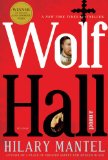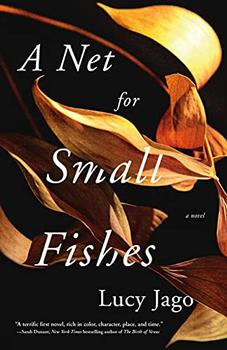Summary | Excerpt | Reading Guide | Reviews | Beyond the book | Read-Alikes | Genres & Themes | Author Bio

A Novel
by Hilary MantelReligion, power, politics, money and sex - key elements of human life - are all on full display in Hilary Mantel's Booker Prize winning novel. With judicious helpings of period detail, she presents an appealing portrait of Thomas Cromwell, the man who managed to free King Henry VIII from the Catholic Church and his first Queen, Katherine of Aragon, allowing Henry to enter into a second marriage to Anne Boleyn.
Whether or not a reader is familiar with the reign and times of Henry VIII, the story itself can be followed effortlessly, aided by the Table of Contents, Cast of Characters and Tudor Family Tree provided. Henry himself appears not only as a king who brought about vast changes in English history but also as a man of his times, influenced by the Renaissance, Martin Luther's Reformation and humanist philosophy, then called The New Learning. Henry's conviction that he must provide a male heir for the throne of England would make Wolf Hall essentially a man's story except that Mantel's retelling through the eyes of Cromwell sheds illumination on the potent role of women in determining English destiny.
Thomas Cromwell, conditioned to alertness by a violent and abusive father but introduced to royalty and privilege by a protective uncle, learned early to move fast, think rapidly and keep his eye out for survival. His intellect and boundless energy eventually brought him into the inner circle of Cardinal Thomas Wolsey, the King's Lord Chancellor, from whom he learned political savvy and the art of persuasion.
Because Cromwell spent his youth in Italy and France, he developed tolerance, knowledge and the humanist views found amongst the advanced thinkers of the time. No man, however, wields power with entirely clean hands. Once Cromwell's gifts landed him in the royal presence, he learned how to channel his scrappiness into a ruthless approach to inevitable enemies, earning him his reputation as a fearsome executioner. One such enemy was Thomas More, papist and man of conscience, who emerges as mean-spirited and fanatical, wearing a hair shirt beneath his robes.
Thomas Cromwell was the ideal man for Henry VIII. He started with nothing to lose, developed capacities for love and loyalty, gained much wealth and position, then risked it all for his beliefs in learning, freedom of thought and compassion for mankind. A Renaissance man, if you will, and a force for change in a time when England, and indeed much of Northern Europe, was emerging from the thrall of Catholicism and the heavy hand of the Pope. Along with Queen Catherine of Aragon and Anne Boleyn, Hilary paints these portraits with colorful language, broad strokes of action and accents of biting wit.
Most fans of historical fiction, including those who have read extensively about the Tudor period, will find new ground covered here. There is something liberating about reading a story while already knowing how it will all turn out, yet I became so sympathetic to Cromwell that I found myself dreading his impending doom. Most impressive is Hilary Mantel's fresh new account of an old, old tale, placing it in the broad canvas of western civilization and the evolution of society.
![]() This review was originally published in The BookBrowse Review in November 2009, and has been updated for the
September 2010 edition.
Click here to go to this issue.
This review was originally published in The BookBrowse Review in November 2009, and has been updated for the
September 2010 edition.
Click here to go to this issue.

If you liked Wolf Hall, try these:

by Jo Harkin
Published 2025
A sweeping historical novel in the vein of Hilary Mantel and Maggie O'Farrell set during the time of the Tudors' ascent. The Pretender tells the story of Lambert Simnel, who was raised in obscurity as a peasant boy to protect his safety, believed to be the heir to the throne occupied by Richard III, and briefly crowned, at the age of ten, as King ...

by Lucy Jago
Published 2022
Wolf Hall meets The Favourite in Lucy Jago's A Net For Small Fishes, a gripping dark novel based on the true scandal of two women determined to create their own fates in the Jacobean court.
Your guide toexceptional books
BookBrowse seeks out and recommends the best in contemporary fiction and nonfiction—books that not only engage and entertain but also deepen our understanding of ourselves and the world around us.